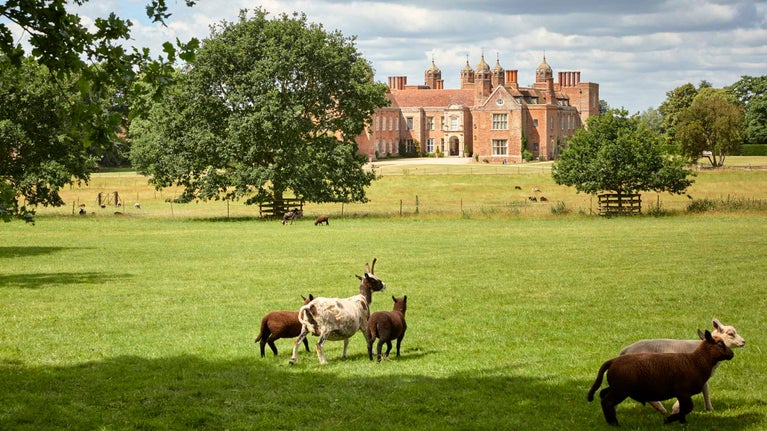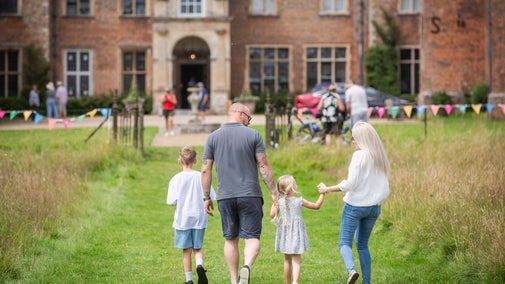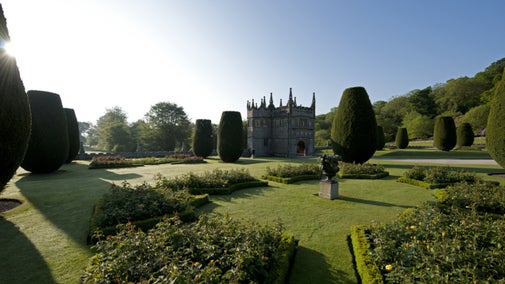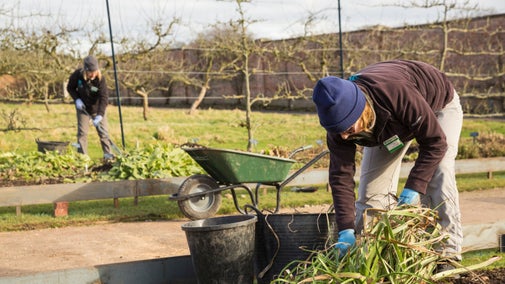
Discover more at Melford Hall
Find out when Melford Hall is open, how to get here, things to see and do, plus much more.

Enjoy a breath of fresh country air at Melford Hall, whether you enjoy a gentle stroll through the garden or a brisk walk in the park. Discover the colours, scents and sights of the seasonal planting throughout the garden and the parkland that surrounds it.
Created by Sir John Savage in 1613, Melford Hall is surrounded by a vast historic deer park. Spanning 130 acres, and sporting a varied selection of specially mown paths, it's the perfect place to enjoy a breath of fresh country air.
As you walk up the hill, enjoy views of the north and east facades of the Hall, which has been standing for close to 500 years. When you reach the took lookout for two local landmarks, which many villagers view as the sign that they’ve arrived home. On your right is the Cedar of Lebanon tree, which stands proud and dominant in the landscape and, in the distance, you can see the tower of the 15th-century church, which contains one of the finest collections of medieval stained glass in the country.
The parkland is an ideal place for you and your four-legged friend to stretch your legs, and there are walking routes of various lengths and difficulties depending on your preferences. However, please note that dogs must be kept on leads at all times as the parkland is shared with free-grazing livestock. You can find out more about visiting Melford Hall with your dog here.
Finished for the season
Join us on a free guided walk through the stunning parkland of Melford Hall, held on the first Wednesday of every month. Stroll among ancient 800-year-old oak trees, uncover the park’s fascinating history, and discover both modern and ancient archaeology hidden within the landscape. Ever wondered where the phrase “By hook or by crook” comes from? Come along and find out, there’s so much more to learn on this short, enjoyable walk.

This part of the garden is dominated by the Banqueting House that was built by Sir Thomas Savage to entertain his most favoured guests. At the other end of the garden, we have the crinkle-crankle wall, originally built in 1739 but rebuilt after the gales of 1987. There are a number of specimen trees to admire, such as the Oriental plane and the Judas trees.
In the lawn is Lady Ulla’s pond, which is being renovated and will be a reflecting pond. It provides a habitat for great crested newts and other amphibians, which we're carefully managing to ensure that they can thrive.
There are herbaceous borders by the west wall, along with a 100-year-old wisteria that will be in full bloom in May.
In the north-east corner is ‘Lord Somerset’s Residence’, a quiet woodland corner planted with a variety of shade-loving plants. The woodland supports a variety of wildlife and is a favourite spot to look for insects or catch a glimpse of smaller garden birds.
Look out for the avenue of yew trees that runs from the banqueting house down to a large, planted urn. Down in the moat, you'll find espaliered fruit trees and a flower border of irises.
After exploring the garden, the north lawn is an ideal place to enjoy a cup of tea while admiring the view of the wider estate and parkland, where cattle and sheep graze.

Find out when Melford Hall is open, how to get here, things to see and do, plus much more.
Explore Melford Hall, which was ravaged by fire in 1942 and brought back to life as a much-loved home to the family who have lived here for over 300 years.

The tea-room at Melford Hall in Suffolk is the ideal place to treat yourself to a cuppa and a tasty treat before, during or after your visit.

Walks, picnics and discovering Beatrix Potter stories in the house are just some of the things you can do on a family day out at Melford Hall.

Explore the history of Melford Hall and trace its evolution through the centuries, from its ownership by Benedictine monks to its royal connections and visits by Beatrix Potter.

Book a group visit to Melford Hall in advance and you can enjoy benefits including group rates and a personal welcome from one of the team. Find out how to book and more.

Want to help make sure that visitors have the best possible visit to Melford Hall? Find out what’s involved in being a volunteer and how you can apply to join the team.

From 18th-century water gardens and Arts and Crafts landscapes to intimate woodland gardens, there are so many places to discover.

Discover our gardeners’ top tips so you can make the most of your garden, plot or window box.
